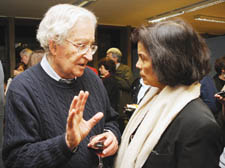|
|
 |
| |

Noam Chomsky meets human rights campaigner Bianca Jagger at the SOAS reception |
Chomsky: still hopeful after all these years
TO the exultant cry of “There he is!”, a faltering, grey-haired figure walked slowly across the stage to the wild applause of a packed audience in a Holborn Hall.
He is a rock star of the political and literary world – Noam Chomsky whose appearance on a London platform is guaranteed to be a sell-out.
Every one of the 700 seats at the Logan Hall for his talk, organised by the School of Oriental and African Studies, on the world’s “unipolar moment” – the role of the world’s only power, the United States – was booked a fortnight ago. At first, I was led on Tuesday evening to a packed overspill meeting in a small hall with a screen, but minutes before Chomsky, now 81, was due to speak, one of the organisers, Johanna Flaherty, found me a seat in the Logan Hall.
Chomsky is a man of the reasoning Left whose books on linguistics and power politics have fed the appetite of scholars and politicos since the 1970s.
A critic of the US, Chomsky saw it as a “global sovereign” that acts on the “Mafia principle” and has been prepared since the 1960s to act “savagely” against any possible “contagion of a virus”. Today, the “virus” was found in Iraq and Afghanistan where US economic interests were threatened. Perhaps controversially, he traced the beginning of the Cold War not to the 1940s but to 1917 when the Russian Revolution “challenged” the US political and economic system. He also criticised the “intellectual class” and the “media” in the US for their failure to challenge the power structure that dominated their country.
Was he pessimistic about the future of the world, faced with global warming, and the political interests of the US? He denied this, though he quoted the Greek philosopher Thucydides who had said the powerful use their power and the weak must suffer.
But he ended his hour long talk with another quote – that of the imprisoned Italian socialist, Gramsci who had said one should have pessimism of the intellect, and optimism of the will.
This drew thunderous cheers, and Chomsky, walked slowly off the stage.
Bottle over the head sparked a long friendship
I HEARD a story last night about the Queen, Margaret Thatcher, George Orwell’s wife Sonia and Michael Shea, whose funeral was held on Tuesday in Edinburgh.
More than 1,000 mourners gathered for the funeral of Shea who had been the Queen’s press secretary until he fell foul of Thatcher for unwisely letting a newspaper know the Queen didn’t like Thatcher too much.
That had led to his dismissal, and the denial of a knighthood by Thatcher. The writer and publisher John Calder told me he had been a close friend of Shea’s since 1962 when he met him in extraordinary circumstances. At the time Calder was literary director of the Edinburgh Festival and was enjoying a meal with Sonia Orwell at a restaurant when Sonia, who liked to drink, had suddenly hit him over the head with a bottle.
“I fell unconscious,” said Calder “and was carried to Michael Shea’s flat where I recovered. From that moment I became a firm friend of Shea. It was so sad to hear of his death. I believe the Queen had made stronger remarks about Thatcher than was thought. After the funeral I met Shea’s widow Mona and she wasn’t happy either about an obituary in The Times that had, apparently, not spoken well of her husband. Oh, a very sad occasion!’
Struggle of the invisible in our midst
I DROPPED into the School of Oriental and African Studies, Bloomsbury, the other day to hear about an illuminating book, Egypt: The Moment of Change.
In Egypt tens of millions struggle on less than two dollars-a-day, largely because of US inspired free-market reforms.
In the middle of the talk a woman rose to explain how thousands of women cotton workers have been occupying a factory in protest against starvation wages.
Ironically, Latino, African and East European women cleaners at SOAS are also in dispute over “poverty wages”.
I was struck how these “invisible” women in London have so much in common with the poor of the Middle East, though their cause goes unreported by our media obsessed with celebrities, City bankers and Old Etonians!
Telling us truths about Afghanistan
I QUICKENED when the speaker mentioned “morals” and “conscience”.
I knew then that he would be different from the other speakers who had dealt with the big political scene. But Lance Corporal Joe Glenton, who had led a Stop the War march to Trafalgar Square on Saturday, was different. He faces a court martial for refusing to go back to Afghanistan because he says the conflict is “unlawful”
He spoke for three or four minutes only – but every unscripted word seemed to convey real feelings. No political clichés for him. His stand was all about his conscience, and I could see he meant it.
Equally passionate was the actor Bill Paterson who recited the late Adrian Mitchell’s famous anti-war poem, Tell Me Lies About Vietnam – in memory of a great man, said Patterson, whose 77th birthday would have fallen on Saturday. With him was the actor Corin Redgrave, who though he is clearly ill, summoned energy, to implore the crowd to keep on campaigning to stop the war in Afghanistan.
 |
 |
|
|
 |
| |
| |
|
 |
|